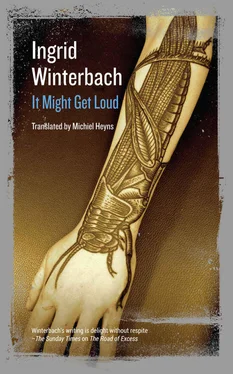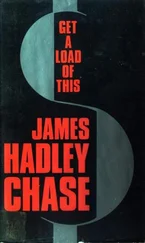Only occasionally Iggy opens his eyes slightly, it looks as if he wants to say something to Karl, but he doesn’t manage even to half-shape the words.
Sometimes tears well up unexpectedly in Karl’s eyes, when he’s sitting like that with his brother. Mostly he just talks at Iggy, whether he can hear him or not. He tells him about the music that he’s been listening to of late, of his meeting with Stevie and the two chaps in Colesberg and afterwards in Beaufort West. He tells Iggy things he realises he never told him, because he assumed that Iggy would have no particular interest in them. He tells him about the live shows he attended, about the first heavy metal groups he and Hendrik went to listen to in London. About Warrior Soul that he went to see for the first time in the Melkweg in Amsterdam, two years later, and how dreadful he found it that Kory Clarke had cut his hair — as if Clarke had thereby been robbed of his strength, like Samson. On the same trip he and Hendrik and Max went to listen to Megadeth, Queensrÿche and Machine Head in Hamburg. Machine Head in the nineties was still a young group, but even then amazingly professional. Karl tells Iggy that the sound was so powerful that he felt its vibration in his chest — it was as if the air was thicker, almost like honey, and the sound so solid that you could just about touch it. Two years later he saw Pantera and Anthrax in San Francisco with friends. But Armored Saint’s show in Dessel, in Belgium, that , he tells Iggy, was the apex — that was the show that of all shows he had most wanted to see, and it was worth every cent and all the blood sweat and tears. He was right in front, as close as possible to the stage — with the kick-ass, blazing red-and-orange logo on a big banner behind the band. They were tight, and loud, and he was swallowed whole by the music, like Jonah by the whale.
He tells Iggy about Machine Head’s new CD — Unto the Locust . It was released before their Eighth Plague tour. He saw them in Madrid, in a small venue, intimate, much like those on the Reeperbahn. Old Rob Flynn on his black Flying V guitar; a soft-spoken guy, but when he sings, his mouth gapes wide open like the jaws of hell. Behind them onstage were two big screens — one of the images was of flames bubbling up. Amazing. A full-on locust on the CD cover, which makes him think of the Biblical insect whose body is such a burden.
In the evenings he goes to see Jakobus on the farm, or meets him for a beer at his hotel in the city. They talk. Or Jakobus talks, and Karl listens. Jakobus tells him about his life, about his friendship with Josias, about the other people on the farm — the Hlobo family, Lucinda and her mother and her children — he talks about his work, about books, about his family, about rugby, about politics. Sometimes Jakobus’s hands are bleeding, Karl sees, from the day’s labours: the bending of wire and the lugging of logs and the handling of heavy tools.
They sit in Jakobus’s part of the large room, by the feeble light, Karl on the garden chair, Jakobus on the log, they drink beer and strong tea. Jakobus rolls cigarettes for himself. Karl decided, from the very first time he set foot on this farm, for his own safety and survival not to look round too much. Especially after seeing the pig’s head, he decided rather not to zoom in on anything around him, he is thoroughly aware of the crazy plethora of things here, in room after room, but at most he glances at it in passing from the corner of his eye — afraid of being sucked into a fucking tunnel from which he can’t escape again. Like Iggy.
This place is insane, it’s loaded. This place is seething with all the energies. It bounces off the walls, off the objects. Perhaps Jakobus was right when he said that there’s as much good as negative energy here, and it doesn’t take much to tip the scale. For Iggy it obviously tipped to the wrong side.
Karl asks Jakobus if he thinks Iggy will recover, if he’ll ever be himself again. Jakobus says: ‘Who knows. Let’s hope so.’
Karl doesn’t show him Iggy’s letters — he only gives him an indication of the contents: Iggy thinking God is turning him into a woman, and so on. Jakobus says he’s learnt not to find anything strange — not what happens to others, not what happens to himself. Reality would seem to have many dimensions — like folds. One day you’re stuck in one context and the next day in a totally different one and you have no idea how you ended up there. A different time zone (he laughs). Or a different dimension (he laughs again). Almost as if you’d tumbled into an alternative universe. Trust, he says, trust and patience, that’s all you can have. He realises anew how weird it is that he ended up here. Well, perhaps not ended, because he has no idea what lies ahead for him.
‘But why should it have had to happen to Iggy?’ Karl asks.
‘Look,’ says Jakobus, ‘things happen to people. Sometimes somebody is just in the wrong place at the wrong time, or (and he utters his abrupt little chuckle again), at the right time in the wrong place, and then you have your cataclysmic collision, or confrontation, as in the case of Ignatius and Josias.
‘Look,’ says Jakobus, ‘you must understand. Josias is like Charles Dickens, of anything you can say about him, the converse is also true. He’s a carer, but he wouldn’t scruple to cast anybody who opposed him into the outer darkness. He’s a champion of the outcast, but he’s sometimes also on a deadly narcissistic mission. He’s a conserver of man and beast, but oh my lord! Destructive! I saw him in action, way back.’
Karl leaves it there for the time being. He doesn’t know, and probably never will know, what to make of Josias and his part in Iggy’s condition. Jakobus has said in so many words that with Josias things can go one way or the other. With Iggy it apparently went the wrong way — to Josias’s destructive side, it would seem. Perhaps Iggy, despite his delusions, had hold of some truth somewhere in thinking that Josias showed him no mercy. Soul murder — that’s maybe taking it a bit far, but helping to engineer his downfall, yes.
He’s learnt, says Jakobus, dig in firmly, but if you’re bowled over, don’t resist. Go with the flow or sit it out.
‘Too late to tell Iggy that now,’ says Karl.
Jakobus nods slowly, and rolls another cigarette.
He asks Jakobus whether he thinks Josias could be related to Johanna Brandt, the visionary. Jakobus just about explodes with laughter. Apparently he finds the idea hilarious.
‘Who knows,’ he says. ‘Perhaps there is a shared gene for clairvoyance and prophecy through all the branches of the Brandt family tree.’
*
After three days Doctor Lonesome says he wouldn’t advise Karl to stay on much longer. He could rather return within a week or three. He hopes that by that time they’ll be able to pronounce with more certainty on Iggy’s condition.
Before leaving, Karl visits his brother for a last time. ‘Iggy,’ he says, ‘I’m leaving now, but I’m coming back. I’m coming back as soon as you’ve woken up good and proper, then we can talk. But any time, any time you want me to come, I’ll come immediately.’
Iggy’s hands are resting on the bedspread. There were times when he chewed his nails to the quick. Now his nails are short, but not chewed. Perhaps the nurses here clip them. Behind his eyelids the eyes don’t even move, that’s how fast asleep he is.
Karl stands next to the bed and looks at his brother for one last time.
‘Iggy,’ he says, ‘I do so hope …’ (what does he hope?) ‘I hope you get out safe and sound on the other side. Perhaps it’s like a kind of tunnel that you have to crawl through, like the culverts underneath the road through which we crawled as kids.’
Читать дальше












